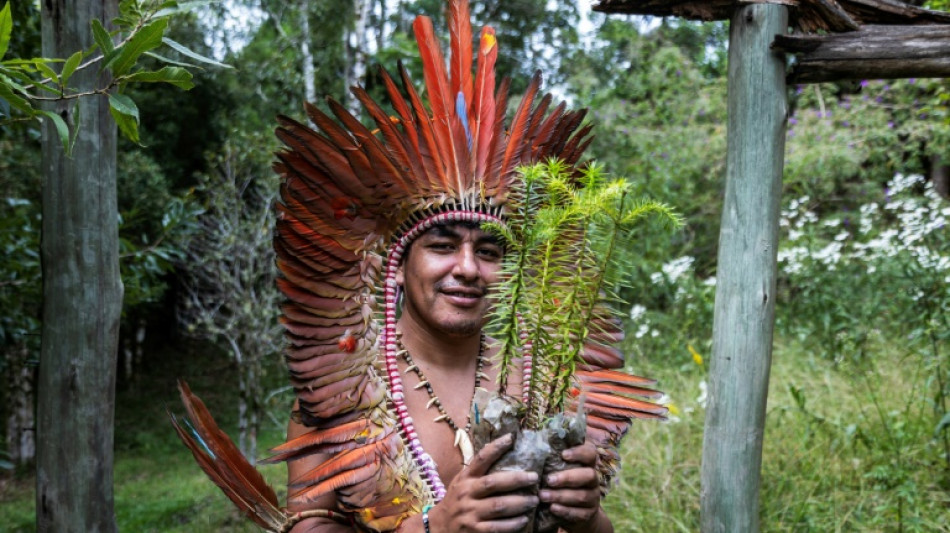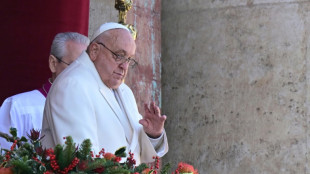
-
 India readies for 400 million pilgrims at mammoth festival
India readies for 400 million pilgrims at mammoth festival
-
Nepal hosts hot air balloon festival

-
 Asia stocks up as 'Santa Rally' persists
Asia stocks up as 'Santa Rally' persists
-
Tears, prayers as Asia mourns tsunami dead 20 years on

-
 Sydney-Hobart yacht crews set off on gale-threatened race
Sydney-Hobart yacht crews set off on gale-threatened race
-
Key public service makes quiet return in Gaza

-
 Fearless Konstas slams 60 as Australia take upper hand against India
Fearless Konstas slams 60 as Australia take upper hand against India
-
Bridges outduels Wembanyama, Celtics lose again

-
 Hungry Sabalenka ready for more Slam success
Hungry Sabalenka ready for more Slam success
-
Mass jailbreak in Mozambique amid post-election unrest

-
 Azerbaijani jet crashes in Kazakhstan, killing 38
Azerbaijani jet crashes in Kazakhstan, killing 38
-
Bridges outduels Wembanyama as Knicks beat Spurs

-
 2004 Indian Ocean tsunami: what to know 20 years on
2004 Indian Ocean tsunami: what to know 20 years on
-
Asia to mourn tsunami dead with ceremonies 20 years on

-
 Syrians protest after video of attack on Alawite shrine
Syrians protest after video of attack on Alawite shrine
-
Russian state owner says cargo ship blast was 'terrorist attack'

-
 38 dead as Azerbaijani jet crashes in Kazakhstan
38 dead as Azerbaijani jet crashes in Kazakhstan
-
Crisis-hit Valencia hire West Brom's Corberan as new boss

-
 Suriname ex-dictator and fugitive Desi Bouterse dead at 79
Suriname ex-dictator and fugitive Desi Bouterse dead at 79
-
35 feared dead as Azerbaijani jet crashes in Kazakhstan

-
 Pope calls for 'arms to be silenced' in Christmas appeal
Pope calls for 'arms to be silenced' in Christmas appeal
-
Syria authorities say torched 1 million captagon pills

-
 Pope calls for 'arms to be silenced' across world
Pope calls for 'arms to be silenced' across world
-
32 survivors as Azerbaijani jet crashes in Kazakhstan

-
 Pakistan air strikes kill 46 in Afghanistan, Kabul says
Pakistan air strikes kill 46 in Afghanistan, Kabul says
-
Liverpool host Foxes, Arsenal prepare for life without Saka

-
 Japan FM raises 'serious concerns' over China military buildup
Japan FM raises 'serious concerns' over China military buildup
-
Pope's sombre message in Christmas under shadow of war

-
 Zelensky condemns Russian 'inhumane' Christmas attack on energy grid
Zelensky condemns Russian 'inhumane' Christmas attack on energy grid
-
Sweeping Vietnam internet law comes into force

-
 Pope kicks off Christmas under shadow of war
Pope kicks off Christmas under shadow of war
-
Catholics hold muted Christmas mass in Indonesia's Sharia stronghold

-
 Japan's top diplomat in China to address 'challenges'
Japan's top diplomat in China to address 'challenges'
-
Thousands attend Christmas charity dinner in Buenos Aires

-
 Demand for Japanese content booms post 'Shogun'
Demand for Japanese content booms post 'Shogun'
-
As India's Bollywood shifts, stars and snappers click

-
 Mystery drones won't interfere with Santa's work: US tracker
Mystery drones won't interfere with Santa's work: US tracker
-
Djokovic eyes more Slam glory as Swiatek returns under doping cloud

-
 Australia's in-form Head confirmed fit for Boxing Day Test
Australia's in-form Head confirmed fit for Boxing Day Test
-
Brazilian midfielder Oscar returns to Sao Paulo

-
 'Wemby' and 'Ant-Man' to make NBA Christmas debuts
'Wemby' and 'Ant-Man' to make NBA Christmas debuts
-
US agency focused on foreign disinformation shuts down

-
 On Christmas Eve, Pope Francis launches holy Jubilee year
On Christmas Eve, Pope Francis launches holy Jubilee year
-
'Like a dream': AFP photographer's return to Syria

-
 Chiefs seek top seed in holiday test for playoff-bound NFL teams
Chiefs seek top seed in holiday test for playoff-bound NFL teams
-
Panamanians protest 'public enemy' Trump's canal threat

-
 Cyclone death toll in Mayotte rises to 39
Cyclone death toll in Mayotte rises to 39
-
Ecuador vice president says Noboa seeking her 'banishment'

-
 Leicester boss Van Nistelrooy aware of 'bigger picture' as Liverpool await
Leicester boss Van Nistelrooy aware of 'bigger picture' as Liverpool await
-
Syria authorities say armed groups have agreed to disband


Brazil Indigenous group fights to save endangered evergreen
Dancing around a campfire in bright feather headdresses, a group of Indigenous eco-warriors prepares the painstaking process of planting the Brazilian pine tree, fighting to save the critically endangered species -- and their way of life.
The Xokleng Indigenous group, who live on a threatened reservation in south Brazil, depend on the Araucaria angustifolia tree for food, use its medicinal properties to treat illness and consider it a central element of their spirituality.
But the majestic evergreen, also known as the candelabra tree, is dangerously close to extinction: just three percent of the forests where it was once found survive today, according to the Brazilian Agricultural Research Corporation (Embrapa).
"Without the araucaria, the Xokleng do not exist," says Carl Gakran, a 32-year-old resident of the Ibirama-Laklano reservation.
He is helping lead the effort to save the Brazilian pine by planting tens of thousands of seedlings.
If the tree goes extinct, "our people and our culture are at risk of extinction, too," he says, wearing a traditional headdress of red and blue feathers.
Standing up to 40 meters (130 feet) tall, with sweeping branches that fan out from the top, the tree lives to be about 400 years old on average.
Its seeds, which resemble large pine nuts, are a staple food for the 2,200 Xokleng.
But it is also prized by loggers for its quality wood -- helping drive it toward extinction, along with the clear-cutting of forests for farmland.
Alarmed by its decline, Gakran and his wife, Gape, founded an organization to save it: the Zag Institute, after the Xokleng word for the tree.
"This is our mother, our sacred tree," says Gape, 36, wearing a headdress similar to her husband's and nursing her baby daughter.
"And we are its guardians."
- Protection ritual -
They estimate they have planted more than 50,000 seedlings so far.
It is a delicate, time-consuming and highly ritualized process.
The seeds take around a year to germinate. Once planted, a young tree takes 12 to 15 years to produce seeds of its own.
Before planting them, the Xokleng perform a ritual, singing and dancing around a campfire to call for the seedlings' protection.
Like many Indigenous peoples in Brazil, the Xokleng have suffered decades of persecution and the encroachment of farmers and loggers on their land.
Their reservation, which they share with the Guarani and Kaigang peoples, is at the center of a massive legal dispute in Brazil.
The territory partly lost its protected status when a court ruled the Indigenous groups did not have the right to claim territory where they were not present in 1988, the year Brazil's current constitution was ratified.
The Indigenous groups argue they were forced to leave by Brazil's military regime (1964-1985), and still have rightful claim to their ancestral lands.
The case became top news under far-right ex-president Jair Bolsonaro (2019-2022), who left office in December having followed through on his vow not to allow "one more centimeter" of Indigenous reservations in Brazil.
It has been appealed all the way to the Supreme Court, whose ruling could establish a precedent for all Indigenous lands in Brazil.
The Xokleng see planting araucarias as another form of resistance.
"I learned from my grandparents that Indigenous peoples are born to protect the land. We're the guardians of the Earth, the forests and the araucarias," says Carl.
"We need everyone's help to protect them."
O.Johnson--AMWN



